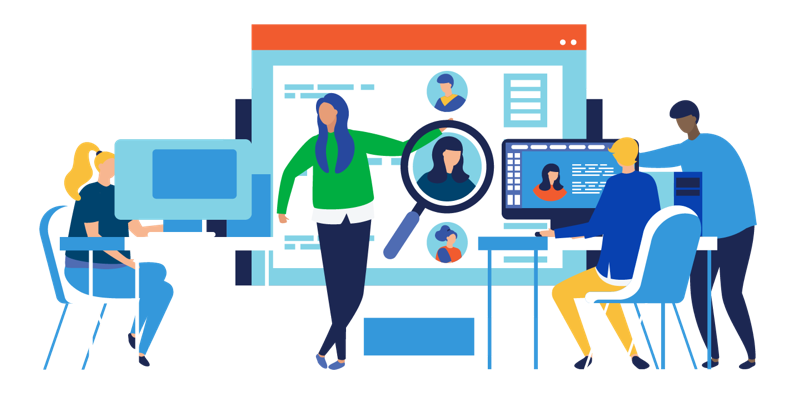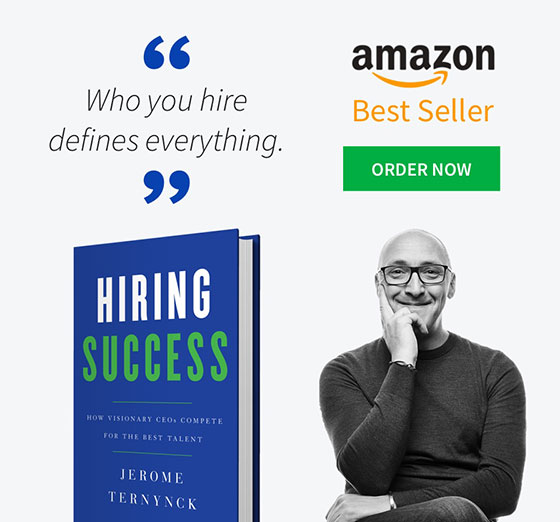Interview Techniques
Hiring Success Glossary

Table of Contents
- Common interview techniques
- Phone interview technique
- Video interview technique
- In-person interview technique
- Group interview technique
- Panel interview technique
- STAR interview technique
- 20 tips for interview prep
- Post-interview techniques
- Post-interview thank you email
- Post-interview follow-up email
- Legacy of Strategies of Effective Interviewing
Common interview techniques
There are no simple interviews as interviews can take on various different forms and can fulfill a variety of goals. When you think of an interview, chances are you imagine a candidate having a one on one in office interview. While this is a common form of interview, there are group interviews, informational interviews, phone interviews and many more. In order to nail your interview, it's important to identify and prepare for the specific type of interview you will be engaging in to maximize your chance of success. Below are summaries of the most common interview techniques.Phone interview technique
When applying for jobs it's likely that a phone interview will be an employer's second point of contact after email communication. A phone interview is where an employer, often a recruiter or hiring manager, calls you to go over the position and get a feel to see if you would be a good fit for the job. It's not uncommon to have multiple phone interviews before being invited to an in person interview.Video interview technique
With the increased efficiency of video software, we are seeing more and more employers turning to video interviews as a way to quickly vet candidates. Video interviews consist of an applicant video calling an employer and discussing the position. A video interview helps an employer note a candidate's mannerisms, preparedness, and appearance more comprehensively than during a phone interview. Employers are also increasingly relying on pre-recorded video interviews, where a candidate records themselves answering interview questions. This gives the employer the convenience of being able to watch the video at any time.In-person interview technique
In person interviews consist of a candidate meeting with an employer usually in the office. The employer will then interview the candidate to see if they would be a good fit for the position. In person interviews allow employers to better assess two things. In person an employer will be able to gauge if you will fit in to the climate and culture of the office. And in person an employer will be able to see if you really want the job, as they will be constantly monitoring your enthusiasm about the role. Remember an employer wants someone who's passionate and not just looking for a paycheck.Group interview technique
Group interviews are when an employer has multiple candidates interview together. Group interviews are extremely efficient for employers as they are able to vastly reduce the time they spend interviewing. Companies also conduct group interviews to assess how well candidates can work together. Group interviews can be especially challenging for candidates as they tend to be stressful, however performing well in them indicates to employers that you are able to perform in high stress situations.Panel interview technique
Panel interviews are a twist on traditional interviews. Panel interviews consist of a candidate being interviewed by multiple interviewers at once. Employers hold panel interviews for a variety of reasons. Like group interviews, panel interviews are often stressful, showcasing to employers how well you will perform under pressure. Panel interviews also show employers how well you can navigate group setting and handling of different personalities.STAR interview technique
The STAR format stands for Situation, Task, Action, Result; each of the words connotes an experience that an interviewee can call back to while being faced with qualitative or quantitative interview questions. Here is a quick reference guide on each word in the STAR technique- Situation: An event, project, or challenge faced
- Task: Explain the task you had to complete
- Action: Steps or procedure taken to relieve or rectify situation
- Result: Close with the results of your effort
20 tips for interview prep
Examine the job description: The job description is a guide to the job. It will inform you of the qualifications and expectations of the job. Carefully reading the job description will tell you what the employer is looking for before the interview. Know why you want the job: Employers always want to know why you are interested in this specific job. They want to make sure that you are not only interested in a paycheck but will go above and beyond for the role. Do your research: Companies want to know that you are not only interested in the specific job, but also in the company. Know the history, values, and structure of the company before your interview. Review common interview questions: Often times interviewers pick a mix of role specific interview questions as well as generic interview questions. Reviewing generic interview questions will enable you to practice and tailor your response ahead of time. Prepare physically: Body language and speech is also important when it comes to interviewing. Make sure you practice sitting up straight and speaking in a calm yet firm voice. Nothing will throw you off and leave a weak impression like having your voice crack mid interview. Have questions of your own prepared: Employers want candidates to ask questions of their own. This indicates to employers that candidates are prepared, interested, and are thorough in making sure that an employment opportunity will be a good fit for both the employer and themselves. Prepare yourself through mock interviews: Practice makes perfect, and interviews are no exception. Practicing the back and forth that occurs during an interview with family and friends will get you more comfortable when the interview occurs and help you tailor your response. Have hard copies ready: Despite being in the digital age, having hard copies of both your resume and references can be a huge leg up. On the off chance that an employer does not have your information on hand, being able to give it to them on the spot shows your preparedness and forward thinking. Plan ahead for transportation: Being on time is an absolute must when it comes to interviewing. Being late shows poor planning, lack of commitment, and everything you don’t want to present to an employer. Know how long it will take you to get to the interview and plan ahead. Be sure to add extra time to the commute to account for anything that could delay you. Interviews are a two way street: Remember that interviews are a two way street. Not only are employers looking for top talent, but you are assessing whether you would want to work for said employer. If during an interview you perform well, but felt that the interviewer was distracted or disrespectful, take note. Interviews are a great way for you to get first hand insight to the company culture and the people you will be working with. Dress for success: Impressions matter. Even if an interviewer tells you it's a casual interview, dress to impress. Dressing appropriately communicates to an employer that you are able to take on client facing roles as well as communicating that you are taking the interview opportunity seriously. Stay organized: Make sure your bag is organized. Digging through a bag filled with wrappers and loose paper looks bad. Don't forget your ID: Make sure you bring an ID. Some buildings require an ID to gain access. Show further intent: Make sure to express further interest near the end of the interview. A question like “What are the next steps in the process?” shows an employer that you are very interested. Take notes: Having a pen and paper ready to take notes is always good. It shows you are actively listening and allows you to remember key details for later. Always be positive: Even if an employer asks what you liked least about your last job, try to put a positive spin on it. Don’t worry about sounding polished: An employer knows that you have practiced responses to common questions, no need to hide it. It shows preparedness. Anticipate concern: If there is an area of your resume that is lacking, be prepared to answer for it. Send thank you notes: Be sure to thank an interviewer for their time after the interview. This should be done within 24 hours. Keep going: Interviews can be hard and looking for the perfect job can take a while. Keep your head up and continue the search.Post-interview techniques
After you have completed an interview, provided you are still interested in the job opportunity, it is always a prudent idea to send a thank you email to the interview team. Additionally, if a week has gone by and you still have not received feedback from an interview team, it is a smart idea to send a follow-up email as well. Below are two thank you and follow-up email templates that you can use for your job search endeavors.Post-interview thank you email
Hello [Interviewer Name], Thank you for taking the time to meet with me today! It was great to learn more about the position, company, and team. I am very excited about the position and think that I would bring [specific skills relating to the position]. I look forward to hearing from you about the next steps. Thanks again for your time. Best, [Your Name]Interview follow-up example
Hi [Hiring Manager’s Name], I hope you’ve been well since I interviewed for the [job title] on [interview date]. I am following up as your team mentioned that you would be finalizing a hiring decision this week. I am wondering if there are any developments in the hiring process, or if there is anything you need from me. If you need any additional information from me, please let me know and I will send it right over! Thank you so much for your time. Best, [Your Name]The legacy of Strategies of Effective Interviewing
Despite being from the 1960’s, Strategies of Effective Interviewing by Samuel G. Trull provides interview insights that have withstood the test of time. Below are some key takeaways from the article:- Have the interview last a set amount of time. This shows you value a candidate's time, and allows you to extract and share valuable information quickly.
- Privacy is key, a good interview should be free from distractions. In an interview both parties should be at ease, this is done by limiting distractions and noises.
- Taking notes allows an interviewer and interviewee to be objective and recall what actually happened as opposed to the feel of an interview.
- Keep yourself involved in the interview but emotionally uninvolved. This allows you to think objectively and foster positive rapport.
- Giving non verbal support is a great way to keep the person talking flowing without interrupting them. Non-verbal affirmation includes actions such as nodding.
- Avoid sarcasm and humor as people often revise and perceive them differently.




